Department of Family Services Alert:

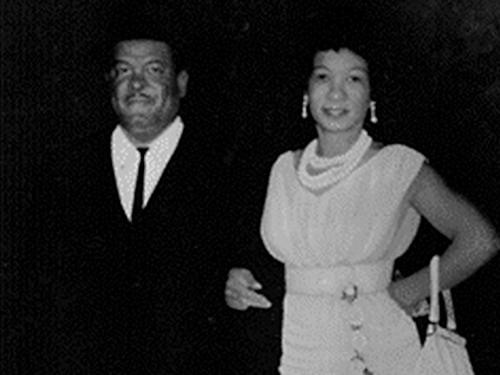 The Gravel and Grit of Olander and Margaret Banks
The Gravel and Grit of Olander and Margaret Banks
It was 1957, and there was gravel as far as the eye could see on the property near Franconia that would one day become a beautiful neighborhood park. Opportunity came to mind when Olander Banks Sr., a young African American entrepreneur, viewed the land. It would be a perfect place to move his quickly growing auto salvage business from the City of Alexandria. His wife Margaret, however, envisioned something even better—a home in the country to raise their growing family. Learn more about Olander and Margaret Banks' story.
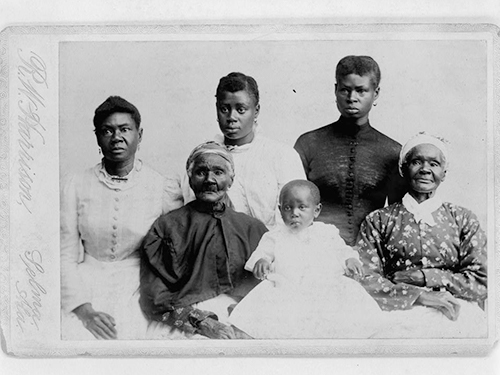 The Quest for Researching African American Ancestors
The Quest for Researching African American Ancestors
Searching for ancestors is a popular leisure-time pursuit, especially for people who are retired. For African Americans it is a complicated quest. Despite the many challenges, there are some strategies to finding ancestors.
– Talk to your oldest relatives.
– Research family names.
– Find marriages licenses.
– Locate death certificates.
Learn more about researching African American ancestors.
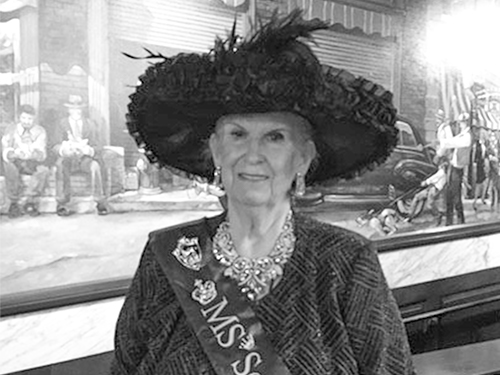 Bonnie Kern Fairbank Trades Tap Shoes for White Wig
Bonnie Kern Fairbank Trades Tap Shoes for White Wig
It was a bold move for the tall teenager with dancing feet. At 16, Bonnie Kern Fairbank packed her suitcase and took the train to New York City. She wanted to perform synchronized high kicks in glamourous costumes with the world famous Rockettes at Radio City Music Hall. Learn more about Bonnie's journey and what she's doing now.
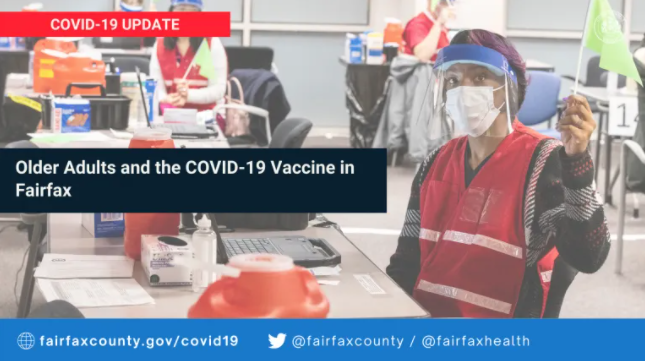 COVID-19 Vaccine for Older Adults
COVID-19 Vaccine for Older Adults
Since the first shipment of COVID-19 vaccine arrived in the Fairfax Health District in late December, thousands of local residents received their first dose. These include health care workers, frontline essential personnel, and older adults.
Public health teams have been working to get all the available vaccines administered as quickly as possible, but caution that it will take time to vaccinate everyone who is part of a group targeted for vaccination as it can take months to get through each priority groups. Learn more about COVID-19, vaccinations and more.
 Award winning writer and educator Rick Murphy will discuss his recent book, Section 27 and Freedman’s Village in Arlington National Cemetery, at Mount Vernon Genealogical Society’s meeting on Tuesday, Feb. 16, from 1-2:30 p.m. It is a virtual program, and all are welcome to attend.
Award winning writer and educator Rick Murphy will discuss his recent book, Section 27 and Freedman’s Village in Arlington National Cemetery, at Mount Vernon Genealogical Society’s meeting on Tuesday, Feb. 16, from 1-2:30 p.m. It is a virtual program, and all are welcome to attend.
Murphy is the National Vice President of History for the Afro-American Historical and Genealogical Society. His book explores how Arlington House, a slave plantation and home of Robert E. Lee, became a military camp for Federal troops, a freedmen’s village and farm, and America’s most important burial ground.
Nonmembers are welcome to attend one program a year without cost. Register no later than Friday, Feb. 12, by emailing your name and address to ContactUs@mvgenealogy.org. Visit MVGenealogy.org.
(Article by Giuliana Valencia, DFS Caregiver Support)
The practice of self-care comes from knowing and understanding our own emotional, mental, and physical needs. It is an intentional practice in one’s life to maintain and promote wellness and wholeness. It is not about adding to your “to-do” list.
For caregivers who are feeling less energy, it may be difficult to practice self-care. A good way to include self-care into your day would be adding activities that you and your loved one can do together. For instance, join a virtual exercise class, go for a nature walk, make space for art, listen to music, sing and/or attend a virtual yoga class.
Looking for new activities to practice self-care? The Fairfax County Park Authority offers plenty: guided park tours, virtual community fitness classes and more. Learn more information at Fairfax County Parks or call 703-324-8700, TTY 711.
This free virtual program is a blend of interactive support and education for caregivers of older adults. It focuses on advocacy and care for the caregiver and care recipient. According to participants, there is an increased feeling of confidence and competence in caregiving after attending the program. Sessions are held via Zoom for five weeks every Monday from Jan. 25 through Feb. 22. For more information, call 703-324-7577 or 703-324-7210, TTY 711.
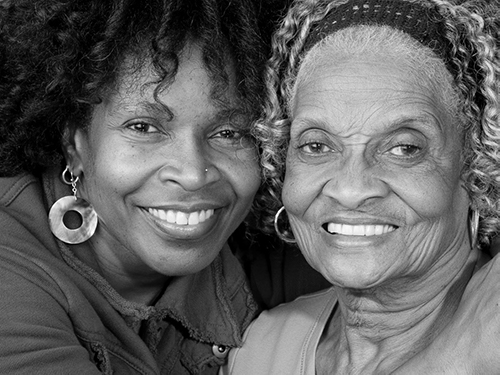 Some topics in caregiving are hard to talk about. Join our ElderLink experts for a discussion about these difficult moments, deal breaker situations, and taboo topics in a safe environment, Tuesday, Feb. 9, 7-8 p.m. Call sessions are via Zoom. A link and alternate phone number to join by computer or phone will be provided after registration is completed.
Some topics in caregiving are hard to talk about. Join our ElderLink experts for a discussion about these difficult moments, deal breaker situations, and taboo topics in a safe environment, Tuesday, Feb. 9, 7-8 p.m. Call sessions are via Zoom. A link and alternate phone number to join by computer or phone will be provided after registration is completed.
Do not let ongoing health problems stop you from living an enjoyable life. Fairfax County’s Chronic Disease Self-Management Program—via telephone—is a free six-week group workshop. You will learn how to live better by effectively managing ongoing health conditions. Caregivers will gain advice on dealing with caregiver stresses. Listen, learn and share positive strategies for better overall health, self-confidence and skills needed to take control and improve your overall happiness. Space is limited, and preregistration is required.
Telephone sessions are held for six weeks every Thursday, Jan. 28-Thursday, Mar. 4. For more information, call 703-324-7721, TTY 711, or email Dianne Duke.
Insight Memory Care Center offers support groups and individual/family consultations to reduce caregiver stress and provide practical solutions for families affected by the Alzheimer’s disease and other memory impairments. Insight Memory Care Center also provides free online monthly education programs that help caregivers build skills and confidence, and learn about other community resources for Alzheimer’s and dementia. A SHARE Program is also offered for families to find a way to plan their future. For more information, contact Lindsey.vajpeyi@insightmcc.org or call her at 703-204-4664.
(Aricle by Camden Doran, NVLTCC Department of Family Services)
A person receiving long-term care services has the right to receive individualized care. Services and activities should strive to attain or maintain a person’s highest practicable physical, mental, and psychosocial well-being. Often this can be addressed in a person’s initial assessment and plan of care (POC).
As each individual is assessed for services, many things should be taken into account, including life history, strengths, functional abilities, and nutritional status. Preferences regarding food, communication, and daily routines should also be honored to enhance quality of life.
Staff, family members, and the person receiving the services should work together in creating the POC to ensure all medical and non-medical issues are discussed and agreed upon. A POC can be updated at any time as an individual’s preferences or condition changes.
As a mandated program under the Older Americans Act, the Northern Virginia Long-Term Care Ombudsman Program is often called to assist
residents and consumers to advocate for their rights to ensure quality of care and quality of life.
For more information about care planning, or other nursing facility and assisted living concerns, please call the Ombudsman Program at 703-324-5861, or contact by email.
(From The Department of Neighborhood and Community Services)
 It has been nearly a year since the COVID-19 pandemic began in the United States, causing residents to isolate at home to help curb the spread of the virus. While doing this has undoubtedly saved lives, it has also led to a rise in social isolation and loneliness, especially among older adults. Social isolation has been linked to an increased risk of dementia, heart attack and stroke while loneliness is associated with higher rates of depression, anxiety and suicide.
It has been nearly a year since the COVID-19 pandemic began in the United States, causing residents to isolate at home to help curb the spread of the virus. While doing this has undoubtedly saved lives, it has also led to a rise in social isolation and loneliness, especially among older adults. Social isolation has been linked to an increased risk of dementia, heart attack and stroke while loneliness is associated with higher rates of depression, anxiety and suicide.
To fight social isolation, the Virtual Center for Active Adults is working to create opportunities for social interaction among older adults through a variety of virtual programs, classes and events.
Older adults and adults with disabilities are invited to join the VCAA to participate and make connections. Lunch Bunch, a social hour that meets every Monday, Wednesday and Friday at noon, allows participants to relax, chat and meet new friends.
Other programs that offer opportunities for interacting with peers include the many game and trivia programs such as Game Show Hour, Music Trivia, Bingo, Brain Games, Cranium Crunches and Crossword Puzzles. Participants can also find opportunities to connect with people who share their interests while engaging in fun activities during a variety of art dancing and language classes.
View the full schedule of programs, classes and events, at the Virtual Center for Active Adults.
(Article by Jacquie Woodruff, Director, Livable Communities Development, Fairfax Area Agency on Aging)
The Fairfax Area Commission on Aging (COA) is an advisory board mandated by the Older American’s Act. Commissioners for the Fairfax Area Commission on Aging are appointed by the Board of Supervisors and the City Councils of the City of Fairfax and the City of Falls Church.
At the Feb. 17 COA meeting, Fairfax County Commonwealth’s Attorney Steve Descano will present on “The Role of the Commonwealth’s Attorney’s Office in Preventing Scams Against Seniors and an Update on the Office’s Priorities.”
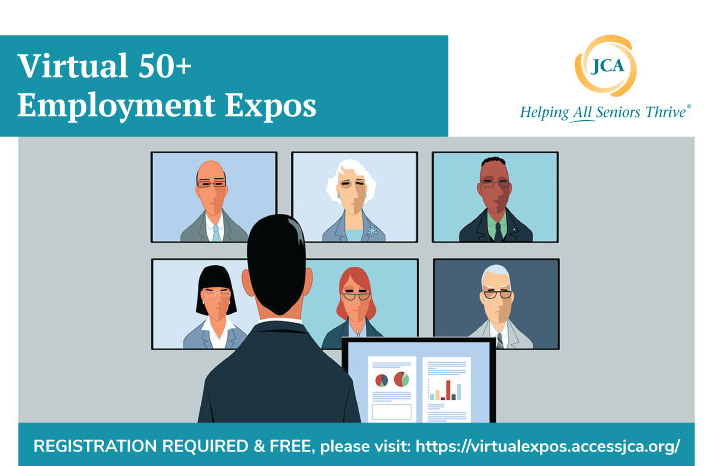 The Jewish Council for the Aging along with the Fairfax County Department of Family Services are pleased to present the second in a series of free Virtual 50+ Employment Expos on Friday, Feb. 5, 10 a.m.-2 p.m.
The Jewish Council for the Aging along with the Fairfax County Department of Family Services are pleased to present the second in a series of free Virtual 50+ Employment Expos on Friday, Feb. 5, 10 a.m.-2 p.m.
This free Virtual 50+ Employment Expo will present two workshops to allow seniors to enhance job skills, hear presentations from local employers and allow participants to ask questions pertaining to each employer’s job opportunities.
To participate register at: https://virtualexpos.accessjca.org. Your Zoom ID will allow you to enter and re-enter the virtual expo all day.
NCS Virtual Center for Active Adults, Fairfax County Senior Centers Medicare 101 Virtual Workshop
Tuesday, Mar. 2, 10:15-11:45 a.m.
Registration is required. To register, call 703-339-7676 or go online.
To request reasonable ADA accommodations, please call VICAP at 703-324-5851, TTY 711.
(Article by Melissa Smarr, Silver Shield Task Force )
Often after the loss of a spouse or partner, people turn to dating websites and Facebook to find a companion or, in some cases, love. Unfortunately, there are predators on the same sites looking to take money away from those who aren’t careful.
Learn more about romance scams.
(From the Federal Trade Commission)
You get a call from someone who says she’s from the IRS. She says that you owe back taxes. She threatens to sue you, arrest or deport you, or revoke your license if you don’t pay right away. She tells you to put money on a prepaid debit card and give her the card numbers.
The caller may know some of your Social Security number. And your caller ID might show a Washington, D.C. area code. But is it really the IRS calling?
No. The real IRS won’t ask you to pay with prepaid debit cards or wire transfers. They also won’t ask for a credit card over the phone. And when the IRS first contacts you about unpaid taxes, they do it by mail, not by phone. And caller IDs can be faked.
Here’s what you can do:
Stop. Don’t wire money or pay with a prepaid debit card. Once you send it, the money is gone. If you have tax questions, go to the IRS or call the IRS at 800-829-1040.
Pass this information on to a friend. You may not have gotten one of these calls, but the chances are you know someone who has.
Want to know more? Sign up for FTC Consumer Alerts.
(Article by Jodie White, Energy Assistance Program Supervisor, Department of Family Services)
The Fairfax County Crisis Assistance Program is currently accepting applications. Crisis Assistance is designed to help households overcome energy emergencies that cannot be met by other resources. An energy emergency is determined when a household has no heat, is in imminent danger of being without heat or there is a past due amount owed on the primary heat source utility account.
Crisis Assistance includes:
Applications for the Crisis Assistance Program will be accepted through Monday, Mar. 15. Submit them:
(by Courtney Arroyo, Office of Emergency Management)
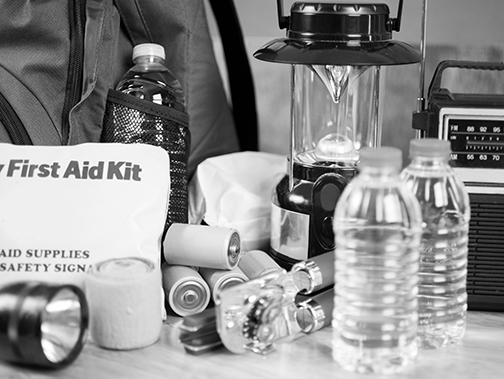 Valentine’s Day is the perfect time to give a thoughtful gift—one that shows you are thinking about safety during an emergency. Why not put together an emergency kit? Simply place the following items in a water-resistant container or bag for safe keeping and within easy reach.
Valentine’s Day is the perfect time to give a thoughtful gift—one that shows you are thinking about safety during an emergency. Why not put together an emergency kit? Simply place the following items in a water-resistant container or bag for safe keeping and within easy reach.
Emergency kits include basic supplies and are tailored to every person’s need. You will need additional supplies if your household has children, seniors, individuals with access and functional needs, or pets. As mentioned above, kits should be kept in a water-resistant container or a sturdy, transportable bag, and stored in a reachable location.
Fairfax County recommends every household keep three to five days’ worth of food, water and supplies in shelter-in-place kits for each member of the household. Get additional information and a complete checklist of items to include in your emergency kit from the Community Emergency Response Guide.
(Article by Susan Jones, Branch Chief, Fairfax County Consumer Affairs)
Fairfax County Consumer Affairs announces National Consumer Protection Week, scheduled for Sunday, Feb. 28–Saturday, Mar. 6.
Consumer Protection Week is a time to help people better understand their consumer rights and assist them in obtaining tools to make well informed decisions.
During this week, Fairfax County Consumer Affairs will provide virtual presentations and share educational resources and tips. A not-to-be-missed event this year: the Virginia Department of Treasury, Unclaimed Property Division’s Virtual Call-in. It is on Tuesday, Mar. 2, from 10 a.m.-4 p.m.
For more information on scheduled events, visit the Consumer Affairs webpage.
Fairfax County Consumer Affairs assists consumers through advice inquiries, mediation and arbitration. Consumer Affairs staff supports the Consumer Protection Commission and the Tenant Landlord Commission. You can watch consumer affairs videos, listen to podcasts, read newsletters and explore consumer topics on our website.
(Article by DFS Adult and Aging Division)
The mistreatment of older adults can happen in many places, including the person’s home, a family member’s house, an assisted living facility, or a nursing home.
To report abuse, exploitation, or neglect of an adult who is 60 years or older or is 18 years and older and incapacitated, call Fairfax County Adult Protective Services at 703-324-7450, TTY 711.
Reports can be filed for people who live alone or with relatives or who are residents in nursing homes, assisted living facilities, hospitals, or group homes.
How We Help
Anyone can report a suspected incident of abuse, neglect or exploitation. Reporting just takes a phone call. State law requires that the identity of people who report suspected abuse, neglect or exploitation be kept strictly confidential. Reporters are immune from any civil or criminal liability unless they act in bad faith or with a malicious purpose. Some people are required by law to immediately report suspected abuse, neglect and exploitation.
Meals on Wheels provides home delivered meals to adults who have difficulty getting out of the home and who are over the age of 60. Meals are also available to those over 18 years old who have a disability and need assistance preparing meals.
The program is targeted to support eligible adults to remain independent in their own homes with support of the Home Delivered Meals program. The Home Delivered Meals program currently provides a weekly, contact free meal delivery of 11 flash frozen meals. Meals are delivered one time per week. To learn more or to apply over the phone, call the Department of Family Services at 703-324-5409.
(From the National Institute on Aging )
 The cost of food can eat up a big part of your budget. The U.S. Department of Agriculture supports Iowa State University’s Spend Smart-Eat Smart website, which can help you create a food budget. Once you have a budget, consider these tips while food shopping:
The cost of food can eat up a big part of your budget. The U.S. Department of Agriculture supports Iowa State University’s Spend Smart-Eat Smart website, which can help you create a food budget. Once you have a budget, consider these tips while food shopping:
For more tips, go to National Institute on Aging National Institute of Health.
The Supplemental Nutrition Assistance Program (SNAP), formerly called “food stamps,” can be used like cash to buy food from authorized retailers. It can also be used to buy food online from Amazon and Walmart but only the food purchase is covered, not delivery fees. Recipients receive an Electronic Benefit Transfer card, which looks like a credit card. Your account is debited each time eligible food items are purchased. A secret Personal Identification Number is required to use the card.
Your household must meet certain requirements to be eligible for SNAP benefits. The application process can be done by computer or phone—no need to come in-person. Apply online at CommonHelp.Virginia.gov/access, or call 1-855-635-4370. For details, call the Department of Family Services Customer Care Line at 703-324-7500, TTY 711.
(Article by Amy Carlini, Department of Family Services)
Channel 16 offers a taste of community! The award-winning station provides county news and government proceedings and features interesting people and places.
Other shows include 16 Around Fairfax, County Magazine, the library’s Check it Out, and Parks Plus. Each of these programs include beautiful footage of county parks and facilities as well as interviews with county staff and residents.
You can enjoy Channel 16 programming online, anytime, or just turn on your television. For online programming, live streaming and the complete broadcast schedule, go online.
(From The Fairfax County Public Library)
Avid readers love to share recommendations for a good book. Sharing the right book can be easy — if you have an excellent memory, are recommending to people who read similarly to you, or you do it on a regular basis, that is. For the rest of us, a reading log or reading journal can help us recall and recommend books we have read.
At its core, a reading log is simply a list of books you read or listen to. Elements you may want to capture in a reading log include:
Logs are easy to keep and capture the basics. You may find interesting patterns with DNFs and authors or categories. Keeping the log in electronic format, like a spreadsheet, can be very useful as a recommendation or a writer’s tool to filter and search when you want to revisit books for research purposes.
Beyond the basics is a reading journal. A journal is also a log, but it can be much more. The elements you capture depend on how you want to use your journal. Readers’ Advisors (think “professional recommenders”) or reviewers may want to recall different elements than writers, and vice versa. Elements you may want to capture in a reading journal include:
A hybrid of the log and journal formats is probably your best bet. Perhaps only fill out the extra “journal” information when the answer to “Would you recommend?” is “Yes,” if there was something particularly striking about the book, or if you rate the book the lowest or highest on your scale.
Remember: this is your journal. There are no rights or wrongs—only what works better or less so for you and your needs. You choose the elements that you want to track. You don’t have to fill everything out every time or get the publication date exactly right for the copy you read.
Your journal is meant to jog your memories, not act as a citation for a paper. Keeping a journal can help you become a more active reader, pinpoint your reading preferences, and understand why you would share a book with someone else—be they a friend, family member or even yourself at a future date.
(Article by Joyce Hylton, Master Gardener)
 As we go into the cold and sometimes snowy month of February, a very important concern continues to be soil moisture content.
As we go into the cold and sometimes snowy month of February, a very important concern continues to be soil moisture content.
Young or newly planted trees that have not spread their feeder roots into the surrounding soils will require more attention and regular irrigation because of limited abilities in obtaining water in their growing environment. All newly planted trees should have 1 inches of water per week—even in the winter—for two years.
This is also especially true of conifer trees and evergreens that have needles that are subject to winter burn. Winter burn occurs when evergreen trees can’t get enough water from the soil to offset the drying effects of wind and extreme cold.
The key to survival is giving trees adequate moisture before winter freezes the world around them. Once the ground is frozen, watering is not possible. Up to 3 inches of mulch can be applied around the planting zone that will protect roots from freeze/thaw cycle and prevent water loss.
The following is excerpted from Winterize Your Trees by Lindsey Purcell, a Purdue University publication.
Watering. Whenever rainfall is insufficient for extended periods, supplemental water is needed, especially on newly planted and less-established trees.
Follow the “5 + 5 rule,” which says to provide 5 gallons of water plus another 5 gallons for every diameter-inch of tree trunk. This should provide plenty of water to help a tree during times of inadequate rainfall.
For mature and well-established trees, 1 inch of supplemental water applied to the root zone every week should keep soil moisture adequate.
Continue to water through the fall until the ground is frozen, so that trees have ample moisture to survive the winter months and are ready for spring growth. If limited rain or snowfall in winter indicates drought, it may be necessary to water in the winter. The best time for winter watering is a warm day, when the temperature is above 40 degrees. Refer to Drought? Don’t forget the Trees! (FNR-483-W) for more information on watering trees.
For information or to view virtual or past programs from Master Gardeners of Northern Virginia, go to mgnv.org.
(Article by Tanya Erway, Volunteer Solutions Recruitment Coordinator)
Are you feeling pandemic-weary? Do you want to brighten winter days that are dreary? Doing acts of kindness might be the “boost” you need.
Below are options to consider if you wish to do a good deed.
 Food For Neighbors, a nonprofit, needs volunteers to help alleviate hunger in Northern Virginia through its Red Bag Program. The initiative specifically tackles weekend food insecurity for middle and high school students. Red Bag Program participants shop for nonperishable items at their convenience and set items on their doorsteps for collection approximately five times per year. Volunteers are needed to collect, sort, organize and deliver food.
Food For Neighbors, a nonprofit, needs volunteers to help alleviate hunger in Northern Virginia through its Red Bag Program. The initiative specifically tackles weekend food insecurity for middle and high school students. Red Bag Program participants shop for nonperishable items at their convenience and set items on their doorsteps for collection approximately five times per year. Volunteers are needed to collect, sort, organize and deliver food.
If you can volunteer, donate food, provide grocery gift cards or help financially, visit https://bit.ly/FFN-RedBag.
Fairfax Court Appointed Special Advocates (CASA) provides volunteer advocates for abused and neglected children referred by the Juvenile and
Domestic Relations District Court. Volunteers must commit to their assigned child(ren) throughout the life of the case (an average of two years) and visit them twice monthly adhering to COVID-19 safety precautions. The CASA volunteer is often the only consistent adult in the life of that child. The first step in becoming a CASA volunteer is to attend a virtual information session. Visit fairfaxcasa.org, and/or email Alexis Shield at volunteer@casafairfax.org for more information.
PRS, Inc., provides behavioral health, crisis intervention and suicide prevention services. PRS CrisisLink staff and volunteers handle crisis calls and texts around the clock. Clinical staff provide behavioral health services through telehealth and in person (when necessary).
Stress relief kits are needed and should include coloring books with colored pencils, stress balls, journals, nonperishable snacks, cards with messages of hope, etc. Kits can be mailed or dropped off at PRS, Inc. (10455 White Granite Dr., suite 400, Oakton, VA 22124) between 9:30 a.m.-2:30 p.m., Monday-Wednesday, or items can be donated via Amazon Wish List. Email volunteer@prsinc.org for more information about the wish list and to set a drop-off time. Learn more about PRS, Inc., at prsinc.org.
Are you connected on social media? Be a virtual advocate. Share PRS’ most pertinent wish list items, volunteer opportunities, and/or PRS CrisisLink hotline and text line numbers with your community. Email volunteer@prsinc.org for more information.
Do you like fostering curiosity and helping children learn? GrandInvolve has partnered with Fairfax County public schools since 2014 to place active, older adult volunteers in Title I classrooms. Due to the pandemic, the program has pivoted to virtual tutoring. If you are interested in learning more about GrandInvolve and its virtual volunteer opportunities, visit www.GrandInvolve.org or email at info@grandinvolve.org.
Herndon Drivers Needed
Herndon Village Network relies on volunteers to drive older adults to doctor appointments, grocery shopping and other activities. This service allows seniors to age in place, and it also helps them to remain connected with the community. If you or someone you know might be interested in helping, go to https://bit.ly/HerndonVillageVol. Submit county volunteer opportunities to Tanya Erway by email.
A medical appointment or trip to the pharmacy is a challenge if you no longer drive. Consider becoming a volunteer driver with one of these organizations:
The Shepherd Centers are a non-profit interfaith organization sponsored by area congregations, community groups, and individuals to serve adults 50 years and older. Its primary purpose is to provide services to assist older adults to continue to live independently in their own homes and to offer programs for enrichment, learning and socialization.
Saturday, Feb. 13, Starting from Scratch with Seeds 10:30 a.m.–Noon
Grow flowers, vegetables and herbs from seeds. Be inspired by a discussion on potting mixes, seed sources and more. Then take home a few seeds to start your own collection. This program will take place on-site with limited registration and social distancing. $22 per person. Wear a mask. Register online or call 703-642-5173.
Saturday, Feb. 20., Virtual EcoSavvy Symposium Program, 9:30 a.m.–12:30 p.m.
Join the annual EcoSavvy Symposium from the comfort of your own home. Dr. Laurie Fox, horticulture associate at Virginia Tech, and Christine Horner, water quality engineer for the Town of Vienna, discuss innovative techniques to capture, store and redirect rainwater on your property. $26 per person. Register online.
Saturday, Feb. 27, The 1st United States Colored Infantry 2–3 p.m.
The movie Glory introduced the African American men who were in the ranks as soldiers in the Civil War. Civil War historian Bryan Cheeseboro will present the story of the 1st United States Colored Infantry, one of the Black regiments that were raised in the District of Columbia. Learn more information.
Saturday, Feb. 27, Virtual Great Shrubs for Home Gardens 10–11:30 a.m.
Take a real-time virtual walk with Horticulturalist Brenda Skarphol as she highlights beautiful flowering shrubs that grow well in Virginia home gardens. A link to connect via Zoom will be emailed before the program. $10 per person. Register online (code 9NQ.75W8) or call Green Spring Gardens at 703-642-5173.
